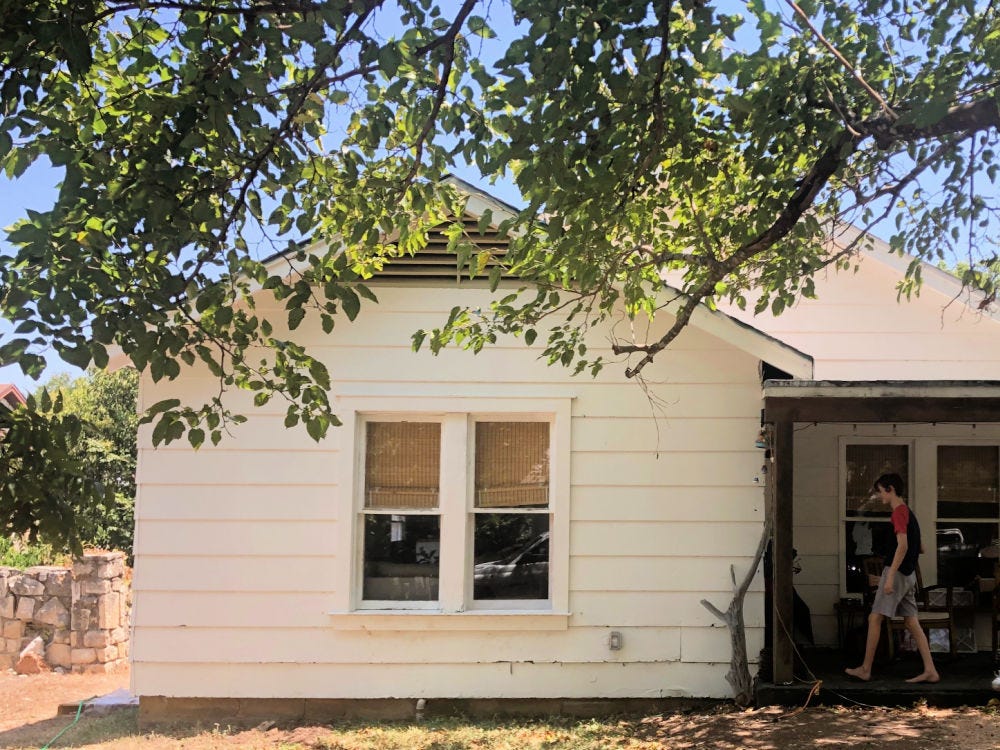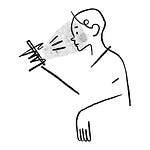Tsh is joined by none other than her husband, Kyle! He’s the general contractor of their own fixer-upper renovation, so in this chat they talk about the hidden beauty found behind old walls and wires. What does it mean to live in your own 1935 renovation project that’s taking four years (and counting)? There are lessons everywhere about knowing your land, knowing your walls, and doing the dirty work so your family can live congruent with your values.
(Seth will be back next week! Never fear.)
Seth: Website | Newsletter | Twitter | Instagram
Tsh: Website | Newsletter | Twitter | Instagram
GK Chesterton’s quote
Gone podcast from Parcast
Garden Answers on YouTube
Pay what you want for Tsh’s audio workshop, Create Your Rule of Life
Scroll down for the transcript.
Tsh: This is A Drink With a Friend, I’m Tsh Oxenreider. Normally I’m here with my co-host, Seth, but Seth is unable to record this week. I thought it would be fun to talk to somebody else for a little bit. But first, before I get into that, I want to share with you a quote that I keep hearing from you guys on social media that has really meant a lot to you when I shared it with you a few weeks ago in Five Quick Things. It’s from the great writer G.K. Chesterton who probably said this 100 plus years ago. I thought of it especially right now during the pandemic when we’re all feeling pretty cabin fevered at home. This is what he says,
“Of all modern notions, the worst is this: that domesticity is dull. Inside the home, they say, is dead decorum and routine; outside is adventure and variety. But the truth is that the home is the only place of liberty, the only spot on earth where a man can alter arrangements suddenly, make an experiment or indulge in a whim. The home is not the one tame place in a world of adventure; it is the one wild place in a world of rules and set tasks.”
I love that quote so much and I found it really fitting for today’s episode because my special guest is none other than my husband, Kyle Oxenreider. Hey, Kyle.
Kyle: Hello.
Tsh: Hello. As you know, since you edit this show, we start off talking about what we’re drinking. Tell the good listeners, what are you drinking right now?
Kyle: I am drinking the dredges of the French press from this morning. I’ve been working long hours lately, so I just needed a little pick me up while we chat.
Tsh: You have been working really long hours, you have earned a 6:00 pm coffee, I guess if that’s what you want. I personally cannot do that. You do you. I know I will watch you fall asleep tonight sometime while we’re watching a movie. You don’t seem as affected by caffeine as I am.
Kyle: Right. How about you?
Tsh: It is the first day, in my book of 2021 that has legit felt really warm. I say that, I know we’ve had some warm days but today’s high was like 78 or something. It’s really starting to feel like spring and I have a drink that I really like when it’s warm and I feel like being outside, and that’s a gin and tonic. I think this is my first gin and tonic of 2021. I say tonic, it’s a pretend gin and tonic because I’m not real here. What I do is I put in a shot of gin and then I crack open a can of sparkling water. Listeners of this show know that I like the local grocery store brand flavored sparkling water, HEB. It’s coconut flavored. I feel like I’m drinking a tropical drink because I also put in a splash of lime and it’s legit good. Listeners, if you want a gin and tonic but don’t want to make the effort to be fancy, just put the sparkling water in a cup and toss a shot or so or even just a splash and there you go. You’ve got a pub worthy drink.
Kyle: That sounds really good.
Tsh: It is very good. I recommend it. It’s been a long week, really long.
Kyle: It has.
Tsh: You and I were both saying, we’re recording this on a Thursday, it feels like a Friday. We’ve got that sad evening feeling of wishing it were the weekend but it’s not quite yet. This is me trying to extend the weekend, I guess, a little bit by pretending like it’s already Friday. It’s not.
Kyle: You’ve been doing school from home, virtually, and normally because the kids go to school, Tuesday, Wednesday, Thursday…Thursday is that soft Friday because the next day the kids aren’t in, they’re in school but they’re at school at home.
Tsh: Our particular school, we had a couple of covid cases this past week, last week actually, so that just means the whole school went virtual while we all got covid tested. Our household is negative but it did mean we schooled virtually and I taught virtually. It is remarkable how much more exhausting that is, truly exhausting. Today is my long teaching day so I basically want to be in the fetal position by the end. After my classes, I took our dog Ginny on a walk and I could barely think straight. I was just walking and staring off into space and enjoying not staring at a screen because I know so many listeners have this experience having kids on Zoom nearly all day or you’re working remotely and you’re on a screen so I know I’m not alone here when I say, by the end of days like this, the last thing you want to do is look at a screen. And of course, here we are looking at a screen.
Kyle: Do you prefer teaching virtually or going into the school?
Tsh: I always prefer in-person because I really like being around the teens. Honestly, my favorite part of this hat that I wear is actually, physically being around the kids and being around other staff members. I’m an introvert but it’s surprising to me how much I crave leaving the house and just being around other human beings. It feels so nice. When we’re at home, I can manage, I can make do, but it is a whole different beast teaching through a screen. It’s a different, you have to think through the different tactics of engagement, a different game plan for your day for how to discuss a book, how to talk about writing. It is challenging doing that even if we are typing essays on a screen, it’s still really hard to talk about writing through a screen. The way I communicate to the kids is different. I find talking about literature on a screen, it’s easier than math. Grace and peace to all the math and science teachers doing this virtually. It’s hard to keep kids engaged talking about a physical book whenever we are talking about it virtually. I much prefer us, we have a Socratic method school and we sit in a circle, we’re all socially distanced so it’s a giant circle for not a lot of kids six feet away, but it’s still in-person and I much prefer that. It is what it is. We’re all doing what we can do.
Kyle: Good.
Tsh: Since I have you as the guest and there’s a lot of things we could talk about that are particular to our unique quirky family, I thought it’d be really fun to talk with you about our home renovation. Long time listeners know that we have been renovating the house that we live in for a while now from when we backpacked around the world to we parked here in central Texas after living in Oregon and deciding to relocate here and finding the house that was just right for us in our small, little, historic town. You are the chief, I guess you would call it, you’re the general contractor of our work because you actually used to be, literally, a contractor. You know what you’re doing all the way from foundation to handing the homeowner the key, it’s just this time, we’re also the client. We’re doing this for ourselves. I thought it would be fun to talk with you a little bit about pulling back the curtain and telling the listeners what exactly we’re doing and then, the topic of this show is sacramentality. What does it mean to see the divine in all things? It’s easy to forget that with a lot of really basic ordinary things like home. But you and both attest to being able to really see the beauty of what it is we are doing even in the midst of the hard. Let’s park first at the what. Tell us a little bit about what it is we are doing.
Kyle: We are taking advantage of a fixer-upper leaning more on our skills of being able to fix up a home and therefore we can get a less expensive home rather than gain a home that’s totally move-in ready but having to pay a lot more, having to pay the market value of what we might be able to sell our home for if ever get to that point.
Tsh: We told each other, whenever we were traveling, I think we can both look back and see our time in Oregon when lived in a small town as really fertile soil for giving both of us a heart for living in a small town, especially a small town that has a bit of culture, something unique about it, whether it’s artsiness or good food or a lot of history. The town here, Georgetown, has all of that. I grew up in Austin, going to Georgetown maybe once or twice a year because I had dance recitals up here at the local university. Even when I was a kid, I remember thinking this is such a quaint, beautiful, small town and I felt more at peace when we were here coming from the suburbs of Austin. We both said, if we are going to relocate to central Texas, where perhaps it’s not as aesthetically pleasing, point-blank, most people would objectively agree, that Oregon has a lot of visual beauty going for it. A lot of geography. Just the trees and the mountains can’t help but be beautiful in the background. It has that going for it so if we were going to relocate to central Texas, which has its own beauty, we really would like to try to live in Georgetown. We knew that came with a price tag. That price tag was either financial or sweat, really. This neighborhood that we live in, we could not afford a fully renovated house. They are so expensive and they go so fast. In fact, the house that we live in now wasn’t even fully on the MLS. The way we happened to be able to get it was because our realtor knew a person who knew a person that made it something that we were able to slide in with an offer, otherwise I don’t think we would have been able to snag this house. We had to get what we got, if you think about it. It was like we had twenty different choices to be in this neighborhood. We just knew we wanted to be in this neighborhood, and we had a fixed budget. We couldn’t just spend an infinite amount of money so that’s how we landed where we are.
Kyle: The other thing that we found when we were living up in Oregon and different places was that we had the idea of it would be really nice to live in a small town outside of a big city. We have the quaintness of the small town but the amenities not too far away. This is the mark of arriving in life but the closest Ikea was 3 1/2 hours away. Here, it’s two exits down the freeway.
Tsh: It’s more like a bell-weather, having an Ikea. It’s not so much a thing we would actually need, it’s just for us a little sign of what size the city is and we love the thought of living in an area that has a lot of local, independent restaurants and shops that we can walk to and had a certain neighborliness and we found what we have in spades. We live near, I don’t know how many coffee shops. One is literally 200 steps from our front porch. It’s on the other side of the house that’s across the street from us. We can walk to our library. We can walk to all our date night restaurants. We hardly go anywhere anymore. We’re getting new things all the time.
Kyle: Right.
Tsh: Seth and I do like talking about sacramentality. You and I like talking a lot about location and why location matters. I feel like there’s an intersection here about home and location and where you dig your roots and dwell and the sacramental nature of living within your land. Living as though where you are matters. I think there is something in particular to that when it comes to renovating. I thought because you are a general contractor you could unpack a little bit about the sacramental nature of what it is we’re doing. First, talking about what it means to renovate something old versus buying something new, not at all for one minute saying it’s bad or wrong to do that. I know tons of listeners live in houses much newer than ours and that’s perfectly fine. I would just like to hear from you a little bit what it is you’re learning about God, about finding beauty by renovating something old.
Kyle: You told me we would be talking about this and it’s not necessarily I’ve been thinking about this just today leading up to this time that we’re talking but this is something that I’ve even just thought about over the whole time of the course of this renovation is what’s the point of this? Why am I doing this? What are the negatives, what are the positives? There’s plenty of both. When we got this house, I knew that there was going to be a lot of work and as much as I really wanted to be able to drop a bunch of money down and hire people to do things, and I knew that I would be having to lean heavily on how God has made me. The skills that he has given me, my brain, the way that I see things, and the visions of what this house could be as well as just the patience to wake up each day and do the thing in front of us, the next thing that’s screaming the loudest. When we moved in, we gutted the kitchen. For a couple of months, we did not have a kitchen. That was my main focus, do what we need to do to get a kitchen. Today, I stop and look at the kitchen and I think, oh my goodness, how did I do that? How did I come up with the idea of putting these things there, getting the pipes in the right place, things like that.
Tsh: Honestly, as somebody who has a brain that works considerably different than yours, I look around our house and I think the exact same thing. I think, how does he have the brain to know how the pipes go? It really astounds me to this day that you can go under the bathtub and from my perspective, just bang around for a couple of hours and then reemerge all dirty and you can say, done, I completely redid the pipes, I re-updated the pipes of this 1935 house. That blows my mind. I don’t understand that and yet I’m so grateful that there are people like you who do so that I can do other things while you do what you do well. I remember you saying, especially early on but I think this is still true, when you are renovating something old, you get an idea of the history of where you are in the most ordinary of ways. It’s not so much that something historic happened in this house because it’s not. We didn’t get a historical marker for this house. It’s just an ordinary family house. But do you remember when we were peeling back the wallpaper when we first moved in and were peeling up layers of carpet, and I feel like in particular, the wallpaper, you could look at the decades go by? There’s the 80s, there’s the 70s, oh there’s the 50s, 40s, all the way to the 30s. To me, it was almost like a scrapbook of a family’s life. We found some newspaper clippings in the wall. Do you remember there was one, it was a movie listing at the local movie theater, which might be that house theater if that’s what they had. We have this old-looking theater that now does community plays and stuff on the square. That newspaper came into our house and whoever lived here, looked at that and they ended up using it for insulation? For whatever reason, it was in the wall.
Kyle: Something like that. Just with the construction of the house, it probably slipped underneath the baseboard, I can’t remember where we found it. That is interesting to delve into something that’s been around and deconstruct it and try to figure out the past. I’ve never really thought of wanting to be an anthropologist or a historian or things like that, I don’t have the patience. I know that it really does matter and I’ll share a little bit more about that later, knowing what I know about modern home construction as I was taking off the sheetrock off of walls to see, oh, this is how they built homes back in the 1930s.
Tsh: Correct me if I’m wrong, the studs are made of, it feels like really solid, heavy wood.
Kyle: That’s the other thing because in 1935 we have this old-growth, super heavy, southern yellow pine type grain wood that you can’t find anymore. It’s almost like when I was rebuilding some walls, it felt like a disrespect to the home to go to Home Depot and buy a $2 2x4.
Tsh: But that’s what we have now.
Kyle: That’s what we have now. When the next people come along and renovate, they’ll see, oh, this is the original wood and this beautiful wood and oh, this is the wood that they had in the early 2000s, wow.
Tsh: Why did they pick this? What we see on home renovation shows that look like an 80s slap on, we’re going to be those people.
Kyle: Right. In fact, speaking of the old studs and stuff like that, the wood is so beautiful that with the walls I took out, I saved those 2x4s and have actually made the floating shelves in our kitchen out of those.
Tsh: Which is really cool. I love the thought that those still live in the house and now they’re actually on display, which is fun.
Kyle: Yeah. There’s a couple of things that I’ve really seen a change in me or things that I would value. You really know somebody by just watching them and finding out what they value. Sometimes I wish I was somebody that didn’t care, that I could just go and get the cheap or the least expensive or sometimes I just have to cringe as I’m nailing on some baseboard that’s the inexpensive pine because that’s what we can do. As opposed to going to a nice lumber outlet and paying three, four, five times the amount of money.
Tsh: It would also probably be faster if you didn’t care so much. But there is a plus side to caring.
Kyle: Right, there is a plus side to caring but there’s also a plus side to getting the job done.
Tsh: Of course.
Kyle: There are some times when I have to make that sacrifice, okay, this is not really what I would choose and this is really not what the house deserves but we need this done. We need baseboards. We need a four-piece bathtub and shower set as opposed to the nice subway tile shower stall that we had envisioned.
Tsh: I’ve talked online for years now and you know from our past about the idea of partial solutions. This concept that I think is just as beautiful as respecting the history of something. The idea of understanding your finite limitations. We are limited by the wood not only that we can afford but that is more readily available in 2021 and that means having to get things we just have at our disposal versus sourcing original old-growth pine for the insides of our walls. That would just be a frustration especially as we live in the renovation project. I don’t that think that this is the project that requires that sort of detail.
Kyle: I found a couple of times I wish I was a creator in coming up with original ideas. I’m one of those people that if somebody comes to me and says, hey, could you do this or could you do that? I could be like, yeah, I could do this or that. But me just sitting on the couch and thinking of original ideas does come difficult for me. However, there are some parameters with this house that, you know what? I do like the openness of the living room and kitchen. With the refrigerator, I was able to create a space where it looks like a built-in refrigerator but it’s built-in to the wall.
Tsh: Right. We prefer to do things like that and I think there’s a sacramental beauty to the idea of recognizing what this house was built with and the era it was built in, but also recognizing it’s a house and the house is meant to serve the people that live in there. It is not meant to become this idol that we worship at all costs, it’s not a museum. We’re not trying to replicate the era in which it came from, we’re just trying to live in it and raise kids in it.
Kyle: I would also say one of the sacramentalities of exemplifying to our kids, you can do hard things. There are areas of this house where I have really struggled to figure out how to renovate it because a wall has a lot of dry rot, how do I fix this? There are things that are really difficult for me that I’ve had to really dive into to research and figure out how to do this but I’ve figured it out. My kids watch me do that.
Tsh: Yeah. In fact, we’ve talked about before there are times when we feel guilty about having our kids live in a forever fixer-upper and there are definitely other sides that aren’t so great to that but I feel like it’s one of those things that they’ll look back in twenty years and appreciate. They probably don’t appreciate it right now as a sixteen-year-old, thirteen, and ten-year-old. In some ways, they might. I’m sure, if they go to their friends’ houses that are in the suburbs where everything is just done, I’m they go there and breath a sigh of relief and think, oh my gosh, this is what it’s like to live in a house that has all it’s baseboards and has insulation on all the walls, this must be nice. There are reasons to do that. I can see how the kids, hopefully, Lord willing, will look back and appreciate the sacrament of living in an old house. Peeling the top layer and seeing the divine of what it means to literally build a home. I don’t know if you remember this, but when we first moved in, you had talked about one of the side benefits is the idea of knowing all the nooks and crannies of this house. If we live here for forty years, you will know where that wire behind the drywall leads to that I don’t know about but you do. There’s something really cool about knowing every square inch and depth of this house.
Kyle: Correct.
Tsh: I’m curious Kyle if you could talk a tiny bit about what it’s doing for you inwardly, as a person living in your own renovation and as a person who is renovating a house for your own family. What is that doing to you in your soul, in your brain, in your body—what is it doing to you as a person?
Kyle: Oh my goodness. I’m an Enneagram 9, which means that I can see both the good side of things and the bad side of things. I don’t hold strong opinions and I’m very much a people pleaser.
Tsh: Yes, you are.
Kyle: I hate confrontation. This project I think in a lot of ways has given me a boost in my skills and abilities that I’m, not that I was already strong in them, but we all have our strengths and our weaknesses. Not that I get an ego boost looking at my house and say, hey, I’ve remodeled all of this, this was a terrible house when we bought it. But I also see what it’s doing to my family living in a fixer-upper wishing that they were living in a fully completed house where every outlet works. Where anywhere you look there’s actually something pleasing, there’s nothing like crummy drywall or paneling on the walls still. There is that tension in me and as well as the overwhelmingness of I have a Saturday off, do I work on the bathroom? Do I start this other project? Do I do just normal house maintenance because we’ve been in this long enough where I’ve actually gone and fixed things that I put in?
Tsh: Normal house maintenance.
Kyle: Normal house maintenance, yeah. There is that frustration that could well up in me but when I get overwhelmed, I have to just remember life isn’t always about living in a finished home.
Tsh: It reminds me—Seth and I are writer types, right? Our work comes from our brain mostly and comes out through our fingers on a keyboard. But really and truly, it lives in our brain, the stories we write. Your work comes from your hands and I’m totally not saying you don’t use your brain. I’m just saying when we look at the end result when someone can hold a book that I wrote, I can look at a table you built or look at the walls you refinished or whatever it is, your work is with your hands. I think something I’ve read before is this idea of rest, of Sabbath, that it’s a really good idea for those of us that work with our heads to rest by working with our hands. Which is why I think I like gardening so much because I have to look at a screen so much for my work that the last thing I want to do is do that. Whereas when you work with your hands all day for a living and then you come home and you continue to work with your hands, at a time when you are resting I think there is something sacramental about the nature of learning to just choose to rest when it’s time even if the house isn’t done, even though you are living in it. To read a book, to rest with your mind, to listen to music, to do whatever it is that truly helps you rest I think is so important.
Kyle: Yes, I totally agree.
Tsh: I think there’s a real beauty to that act of trust, that act of going where the work leads. For people listening who feel a little like they want to live in an old home but aren’t sure where to begin or whether it’s worth the effort, what would you say?
Kyle: That’s really tough because I feel like I made, or you and I made the decision for us. I don’t really remember seeking counsel.
Tsh: I think we both agree that we have experienced, that we just feel a little different than a lot of our peers and that’s not a bad thing. Our friends are not wrong for not wanting to live in a fixer-upper. I think it takes a unique kind of person. It’s just that this is the choice that we have made, the is the price we’re paying for the cost of living for where we live. In a neighborhood that’s super walkable and historic. That’s just where we’ve chosen to invest in.
Kyle: Yes. I like how you put it earlier. We’re basically banking on our sweat, not on our money. I think we have lucked out. We haven’t, so far, I don’t feel like we have purchased a money pit.
Tsh: No. Just be aware that there’s a cost to all decisions.
Kyle: Right.
Tsh: There’s just as much a cost of buying a fully made home that is perhaps in a not ideal location but you don’t have to do anything to it, you can walk in and move in. It’s not that any one choice is better than the other, it’s just considering what you care about. You and I, we had talked about how we had purposely chosen to live in a smaller home so that we can afford it and not be house poor, not have too much money tied up in our home so that we can do things like travel. We care more about that and we’d rather do that and live in a small house or not have super fancy cars or whatever. It’s the same thing in choosing whether you live in an old fixer-upper or a new home. There’s pros and cons.
Kyle: We have definitely felt some of the negatives of having a home that’s in a renovation whether that’s do we feel comfortable having people over when the house is in this stage? Do we feel comfortable spending money on a vacation or taking the time out to do something else as opposed to staying here…
Tsh: Because there’s always work to be done.
Kyle: Because there’s always work to be done. There’s that tension of when you’re on a vacation, I just want to be home working on the house but also, I’m at the point, there’s times where I wake up and I feel like I wake up in my office. I wake up at my job. Everywhere I look, I see something that needs to be done and 99% of the time, it’s going to be done by me. Because I don’t want my kid to be having to work with a table saw when he’s not ready or my daughter getting electrocuted or something like that.
Tsh: But you’re still glad, overall, that you’re doing it?
Kyle: I am, yes. I think that hindsight 20/20 I’m choosing to be thankful for the choices that we have made and the opportunities that we have had.
Tsh: To bring it full circle, back to the quote from G.K. Chesterton, he talks about “…the truth is that the home is the only place of liberty, the only spot on earth where a man can alter arrangements suddenly, make an experiment or indulge in a whim. The home is not the one tame place in a world of adventure; it is the one wild place in a world of rules and set tasks.” I would say, that’s this house pretty much.
Kyle: Very much. It has been quite an adventure and there’s been lots of whims taken and I know that he probably isn’t thinking of living in a fixer-upper but there’s things that I’ve learned and just challenges that I’ve gone through here that have actually made me a better person out in the world.
Tsh: I think that there is a real beauty to the idea that you more or less became the neighborhood handyman. Who knows what will happen from those relationships that you built a little bit as our friends down the street said, you are officially the patron saint of cracked pipes and old ladies? Sweet old ladies?
Kyle: [laughs]
Tsh: I just think there’s a real beauty to that, the idea that our neighborhood is old. All the houses are of all sorts of eras. Our house is by far not the oldest one. There is something old school about our neighborhood that I just love. I think that’s reflected in the old architecture and in renovating it slowly. I think there is a real beauty to it, embodying the kind of life that we want to live in the life that we live here. Thank you for the work that you do and for the money you save us. It does not go unappreciated.
Kyle: You’ve very welcome. Thank you for putting up with the slow renovation and the tools that are sitting right next to where you’re trying to make dinner.
Tsh: We’ll talk about that later. I’m just joking. You’re most welcome.
Seth and I like to wrap up our conversations by talking about something that we are reading, watching, or listening to. It would make complete sense to ask you as well. Kyle, what is one thing that you are currently reading, watching, or listening to?
Kyle: I found this podcast, it’s called Gone by the Parcast network. I think par, for what I’m guessing, it means paranormal or something like that. They just have some good mystery-type podcasts or they have a podcast called Tales, which they tell old fairy tales. A lot of Hans Christian Anderson, Perrault, all the classic fairy tales. I have been listening specifically to a podcast the past couple of days called Gone. I’m not very much of a historian as I just mentioned earlier, but it’s interesting listening to them talk about the different people and items and things like that got lost to time or that we just don’t know what happened to them. Like today I listened to them talking about D.B. Cooper who was a guy that hijacked a plane and them jumped out of the back of it with $200,000, which is a little more than a billion in today’s money, and vanished. I also listened to the one about the library of Alexandria trying to figure out what happened to that. They just talk about what may have happened and they also bring up the history of it and potential theories of where it is or what happened to it. I find that stuff fascinating especially when it’s well told.
Tsh: Good storytelling is hard to find.
Kyle: It is. How about you?
Tsh: I typically talk about a story-related thing and this time though I’m getting really practical. I guess maybe because I knew I was talking to you and we were talking about home renovation. This is the time of year where I am thinking pretty much non-stop about gardening and I’m even having a hard time staying focused on my book writing and my other work. All I want to do is be in the backyard working on the garden and the raised beds that you just finished building, getting the soil ready, and planting because here in central Texas it is time. It is a YouTube channel called Garden Answers. It is this woman named Laura. She’s up in the area of Oregon where we used to live, I think. She is just really personable and friendly and straightforward. You know how you just find a good YouTube channel that just gets to the point? Their videos are super helpful, they are well produced. They have a ton of them. She’s been really helpful. If I search for something really obscure, like this morning I was searching our irrigation lines that we want to put in, she had videos on that. Who knew? She has videos on strawberries in containers, how to plant certain types of potatoes and lavender. Garden Answers on YouTube is my current watch. I find myself even whenever I would normally watch a show, I’m just watching YouTube videos on gardening right now because that’s just what I’m in the mood for and I know the season will be gone before I know it and I’ll be back to doing something besides gardening but this is just what’s on my mind. I love her channel.
Kyle: Good.
Tsh: Alright, it is time to wrap this up and our kids are going to be happy because they want dinner. You can always support me and Seth’s individual work via our newsletters on Substack. If you want to support this show, you can do so at buymeacoffee.com/drinks — this is where you can pick up the next round of drinks for just a few bucks, which helps keep the lights on around here (the link is also in the show notes). You can find me at tshoxenreider.com, that where you can find links to all my things, my books and all the other stuff I work on. Music for the show is by Kevin MacLeod, editing is by Kyle Oxenreider, and Caroline TeSelle is our transcriber and assistant extraordinaire. This is especially weird, editing is by a certain one, Kyle Oxenreider. Thanks for editing the show, Kyle.
Kyle: You’re welcome. My pleasure.
Tsh: I’m Tsh Oxenreider, and Seth and I will be back here with you soon. Thank you so much for listening.












